The comprehensive education system is now well into letting down its second generation of scholars. Amongst the better-documented failings of this regime, there lies one which has probably escaped the notice of many commentators. It appears that many adults are emerging from this woefully inadequate institution not knowing their parts from their places! Let me explain.
I listen faithfully to the BBC regional radio stations, and I have heard reports (both on Radio Shetland and Radio Aberdeen, but I have no doubt the problem is more widespread than this) of events TAKING PART and participants TAKING PLACE in them. This has become so prevalent recently that it is beginning to make my curmudgeonly, pedantic and pre-comprehensively-educated blood boil. I feel obliged to record my protests against this latest assault on good usage of the English language.
If, during my secondary schooldays, I had presented a piece of composition, containing such a piece of grammatical incorrectness, to Lollie or Johnnie Graham (the English teachers at that noble establishment), it would have returned adorned with an enthusiastic chiding in red ink. The tragic thing is that mine is probably the last generation which will even notice the error. I may as well enjoy my pedantry while I'm still around and there are still a few of my elders and contemporaries who have a clue as to what I'm talking about.
It makes me sad to think that grammatical refinement will soon be an obsolete irrelevance to most people. The standards which my generation regarded as commonplace, at school and beyond, will soon be considered unnecessarily esoteric, and have no place in the digital age. After all, some may argue, what are spell-checkers for?
Spell-checkers will give the correct (probably American) spelling for any word considered by the compilers to be in common usage, and this should explain its inadequacies and limitations quite well. It takes no account of context, English idioms, figures of speech or other phraseological idiosyncrasies which make this language so much larger and richer than the sum and spelling of its words.
The same applies to the dialect of my dearly-beloved Shetland, which once contained thousands of words which were entirely unique to this part of the world. They do not appear in any spell-checker, and each subsequent generation is losing thousands of these words and phrases - for ever. There are many reasons for this, chief of which is that the way of life which was defined by these words and phrases, and to which they pertained, no longer exists. What is left is being corrupted, mostly (but not entirely!) unintentionally by those using it, and by racial, cultural and socio-political influences.
There are probably few who will mourn the passing of grammatical correctness (which has been largely replaced by the hilariously ultra-pedantic political sort). However, written prose and general social conversation are much the poorer for its absence, and I wish I could feel smug about being one of the last generation to know its parts from its places.
The Grumpy Old Artist
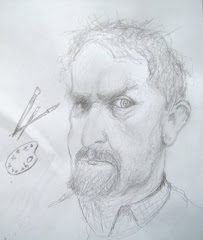
Would YOU pose for this man???
Exhibition Poster
Catterline Event, 2011
Oil Painting by Jim Tait
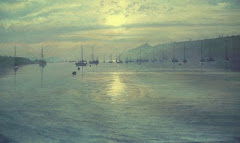
Helford River, Cornwall
Oil Painting by Jim Tait
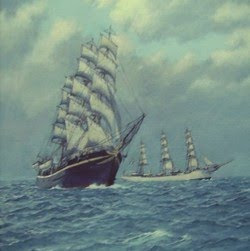
Full-riggers "Georg Stage" and "Danmark"
Other Recent Works
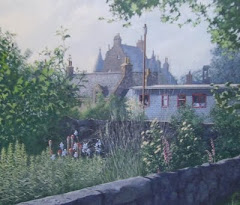
Fordyce Castle and Village

Hay's Dock, Lerwick

Shetland-model Boats at Burravoe, Yell
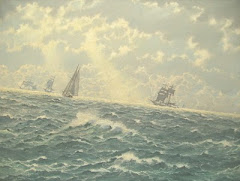
Tall Ships Seascape

The Tour Boat "Dunter III", with Gannets, off Noss
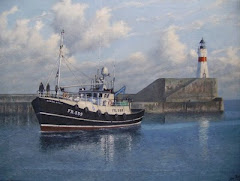
The "Karen Ann II" entering Fraserburgh harbour
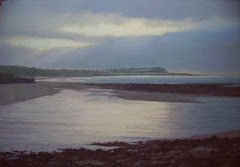
Summer Evening, Boyndie Bay
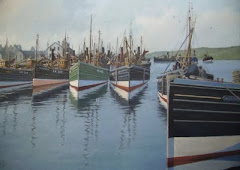
1930s Lerwick Harbour

Johnshaven Harbour
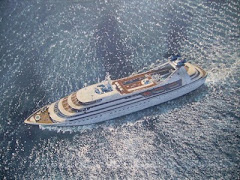
"Seabourn Legend"
Greeting Cards!
Now Available in Packs of Five or in Assorted Sets of Four
Sunday 12 June 2011
Sunday 5 June 2011
IT'S AN ILL WIND......
Wednesday June 1st dawned wet and windy, and it got wetter and windier as the day went on. At morning coffe-break time, I looked out through the gloom over Breiwick Bay, and I could just make out the massive receding form of the 93,000 grt cruise ship "MSC Poesia". I don't think she ever got her anchor dropped - they'd seen enough of this awful place, and I can't blame them for heading off to a place where the weather might be kinder.
What a pity she hadn't been here the day before, when the sunshine was almost unbroken, and the south-westerly breeze was gentle and balmy. I spent that morning clearing the border at my mother's house, in preparation for setting a few plug plants (of a species as yet undetermined!), while my sister Thelma attended to a few other tasks around the building, as well as using the garden hose to wash some of the Icelandic volcanic residue from her car. Mother was into the second week of her respite fortnight at Wastview Care Centre - she comes home tomorrow, and I'll be there to help her settle in again.
Now, one of the strange side-effects of the Icelandic volcanic ash cloud, which caused such chaos among airports and airlines in the spring of last year, appears to have been on people's gardens in these islands, and in those of our neighbouring archipelago of Orkney (according to one of the contributors to Radio Orkney's Postbag last Wednesday). Last summer, the honeysuckle bush which, for decades, had been sprawling over the back garden wall at Brugarth, Whiteness, and throwing out a few reluctant flowers each summer, suddenly burst into a peach-coloured cascade of blossom. This year the daffodil blooms seemed to be twice the size and number they usually are, and that all over the islands.
Can it be that what has been causing grief to car-owners (and joy to purveyors of car-cleaning equipment), and costing the airline industry millions of pounds, is having a beneficial effect on our flora? Or not? Does anybody care? Or not?
Whether you care or not, have a nice week!
What a pity she hadn't been here the day before, when the sunshine was almost unbroken, and the south-westerly breeze was gentle and balmy. I spent that morning clearing the border at my mother's house, in preparation for setting a few plug plants (of a species as yet undetermined!), while my sister Thelma attended to a few other tasks around the building, as well as using the garden hose to wash some of the Icelandic volcanic residue from her car. Mother was into the second week of her respite fortnight at Wastview Care Centre - she comes home tomorrow, and I'll be there to help her settle in again.
Now, one of the strange side-effects of the Icelandic volcanic ash cloud, which caused such chaos among airports and airlines in the spring of last year, appears to have been on people's gardens in these islands, and in those of our neighbouring archipelago of Orkney (according to one of the contributors to Radio Orkney's Postbag last Wednesday). Last summer, the honeysuckle bush which, for decades, had been sprawling over the back garden wall at Brugarth, Whiteness, and throwing out a few reluctant flowers each summer, suddenly burst into a peach-coloured cascade of blossom. This year the daffodil blooms seemed to be twice the size and number they usually are, and that all over the islands.
Can it be that what has been causing grief to car-owners (and joy to purveyors of car-cleaning equipment), and costing the airline industry millions of pounds, is having a beneficial effect on our flora? Or not? Does anybody care? Or not?
Whether you care or not, have a nice week!
FETTERCAIRN
Well, here it is - my version, in oils, of the village of Fettercairn. It is one of the results of many trips around the Mearns area of north-east Scotland, with my brother in his car. I've portrayed the scene as it would be in March, with a newly-ploughed field in the foreground, behind which are the trees and red-brick houses of Burnside Road. Although there are many picturesque views in the north-east, this was one of three which I knew I'd have to paint as soon as I saw it, the others being St. Cyrus from the north, and Boyndie Bay, viewed from Scotstown, Banff, with the headland of Whitehills on the other side of the bay.
For many listeners of radio Scotland winter traffic reports, the name of Fettercairn will be familar, as the road between here and Banchory, over the Cairn o' Mount, is frequently closed by snow.
I've turned my eyes seaward again for the next paintings, which will be seascapes featuring Aberdeen trawlers. I've begun work on two of these, with intent to build up my stocks for the Catterline exhibition at the end of the year. I'm still proceeding under the assumption that I have a display booked at that time and venue, as I haven't heard anything to the contrary!
For many listeners of radio Scotland winter traffic reports, the name of Fettercairn will be familar, as the road between here and Banchory, over the Cairn o' Mount, is frequently closed by snow.
I've turned my eyes seaward again for the next paintings, which will be seascapes featuring Aberdeen trawlers. I've begun work on two of these, with intent to build up my stocks for the Catterline exhibition at the end of the year. I'm still proceeding under the assumption that I have a display booked at that time and venue, as I haven't heard anything to the contrary!
Subscribe to:
Posts (Atom)









